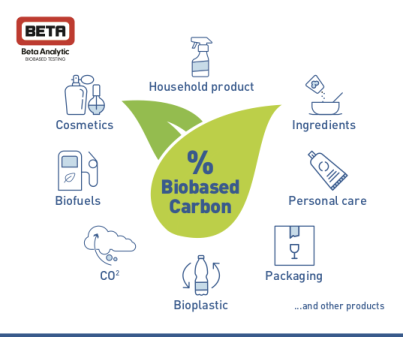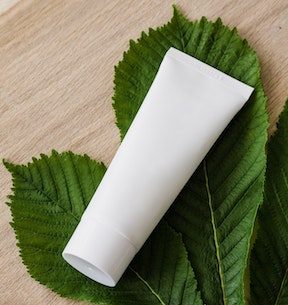Are Greenology’s Household & Personal Care Products Really Biobased?
In an article co-authored with Greenology Products, Beta Analytic’s Marketing Manager Haley Gershon describes the use of Carbon-14 testing to verify biomass-derived ingredients used in the formulation of household and personal care products and explains the need of such testing to qualify for certain certification and eco-labeling programs.
Understanding Biobased Content

The preference for plant-based household and personal care products has led manufacturers to develop biobased products. Carbon-14 testing is an appropriate and accurate method to verify biobased ingredients, since it measures the percentage of plant-sourced ingredients versus petrochemical-derived components in a product. Since Carbon-14 is a radioactive isotope present in all living organisms, any product derived from renewable sources will contain Carbon-14. On the other hand, fossil fuel-derived products do not contain any Carbon-14.
Carbon-14 test results are expressed in percentage (%) of biobased content ranging from 0% to 100%. A product that is entirely composed of renewable materials will yield a result of 100% biobased content. Whereas, a product that contains only petrochemical-derived substances will yield a result of 0%. A result in between these values indicates that the product is a mixture of biomass and fossil fuel-derived ingredients.
Visit this page for more details: Understanding Biobased Carbon Content Measurement
Biobased Content Case Study: Greenology Products
Greenshield Organic is a brand of Greenology Products that manufactures the first line of organic detergent and cleaning products in the USA. Greenology Products also offers organic and natural private label products in the home and personal care industries to retailers in the country.
The company has helped to bring more than 75 U.S. Department of Agriculture (USDA) Certified Biobased products to the market. With the objective of certifying those products, Greenology Products collaborated with Beta Analytic to perform the Carbon-14 testing on new formulations, not only to achieve the USDA Certified Biobased Product Label, but also to help confirm the formula ingredient derivation. Greenology products that have been tested include:
- Dish soap – certified at 71% biobased
- Multi-surface wipes – 98% biobased
- Liquid laundry detergent – 98% biobased
The company’s Organic Multi-Surface Cleaner Degreaser product achieved both USDA Certified 100% Biobased and USDA Certified Organic, which indicates that the product is wholly derived from natural ingredients and grown and processed organically in accordance with the USDA National Organic Program’s standards.
USDA BioPreferred Program
When it comes to certification, the percentage of biomass required will depend on the program. The USDA BioPreferred® Program, for example, establishes the minimum biobased content depending on a product’s category.

Examples of USDA Certified Biobased household and personal care products categories and their minimum biobased content requirements:
- Dishwashing Products – 58%
- Bath Products – 61%
- General Purpose Laundry Products – 34%
- Deodorants – 73%
- Shampoos – 66%
Carbon-14 analysis is a reliable method for determining the percentage of biobased content within a product formulation. Test results allow companies like Greenology Products to qualify for certain certifications, such as the USDA Biopreferred Program by validating if their products meet the required percentage of biobased content.
For more information, please read Beta Analytic’s full article “Greenology Products verifies household & personal care biobased products” (pp 50-51) published in Household & Personal Care Today Journal in December 2021.
Beta Analytic’s Carbon-14 Testing Services
ISO 17025-accredited Beta Analytic is an ASTM D6866 biobased content testing laboratory based in Miami, Florida, with a standard turnaround time of 7 business days or less. Faster services are also available.
Interested in certifying your biobased product?
Beta Analytic is committed to provide high-quality, reliable testing to fulfill the requirements of the USDA’s BioPreferred Program. The company is not affiliated with Greenology, the USDA or the BioPreferred Program.
Photo credit: Karolina Grabowska from Pexels
This entry was posted on Friday, January 7th, 2022 and is filed under Beta Analytic Case Studies, Beta Analytic Updates, Biobased Products, USDA Biopreferred Program .